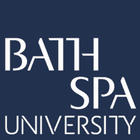About MA Visual Communication in Bath Spa University
This is a practical MA Visual Communication course for photographers, illustrators and graphic designers. We encourage you to work independently and collaboratively, while learning a shared visual language.
Working alongside other students and in consultation with your tutors, you'll build a professional and critical context for your practice, in the process of developing each of your projects.
Your growing confidence and increased ability will be clearly evident in the portfolios you present when you enter the industry or continue your studies.
You’ll develop your visual communication practice, concentrating on practical, conceptual, historical and contemporary concerns. You’ll enter critical dialogue with other students in related fields and we’ll help you place your practice in an appropriate context. Our view is that by integrating your methods with those in related fields, you’ll become a more effective specialist photographer, graphic designer or illustrator. At a time when boundaries between these disciplines are changing – and in some cases dissolving – this is particularly important.
You’ll become adept at working individually and collaboratively. Through developing an individual specialist project, you’ll conceptualise, critique and contextualise your approach, while fine-tuning your aesthetic sensibilities. You’ll also collaborate to produce joint projects, negotiating the final outcomes with your team members.
You’ll graduate with:
- A broad, informed outlook
- A genuine confidence in your abilities
- The skills necessary to succeed in your chosen specialism.
Careers
Graduates from this department have become graphic designers, illustrators, photographers and photo editors for design agencies, architectural and engineering practices, the MOD and other specialist areas. Many also work on research projects in conjunction with fine artists, or scientists, or have gone on to become teachers.
Academic qualification equivalents
- Normally a Bachelor's degree with honours and a good passing grade from an internationally recognised university or Higher Education institution
- Other international qualifications to an equivalent standard will also be considered.
English language requirements (one of the below):
- IELTS: Academic 6.5 or 7.0 This must include a minimum of 5.5 in Listening, Speaking, Reading and Writing.
- TOEFL iBT: This must include a total of 75, to include a minimum 18 in Reading, 17 in Listening, 20 in Speaking, and 17 in Writing.
- PTE: This must include a minimum of 67 in Listening, Speaking, Reading and Writing.
Bath Spa University Highlights
| Type |
Public |
| Campus Setting |
Urban |
| Tuition Fees for International Students (full-time degrees in 2020-2021) |
13,700 GBP - 15,300 GBP (varies with the courses) |
| Campus Housing Capacity |
25% |
| Student Retention Rate |
89% |
| Scholarship Availability |
Yes |
| Applications Accepted |
Online |
| Work-Study |
Available |
| Intake Type |
Yearly |
| Mode of Program |
Full time and part-time |
Bath Spa University Average Tuition Fees And Other Expenses
International students joining the Bath Spa University are required to pay 70% of the tuition fees on or before arrival and commencement of the course. All payments should be made in £ sterling and the easiest way to make a payment is via Flywire. However, the payment can also be made through credit/debit card.
International students should open a UK bank account as soon as possible after arrival.
The estimated cost of attendance depends on several factors like the program applied for, tuition, books, fees, housing, dining, and personal items.
| Expenses In GBP |
Undergraduate (per annum) |
Graduate (per annum) |
| Tuition Fee for International Students (full-time courses) |
13,700- 15,300 (varies with the field of study chosen) |
13,700- 15,300 (varies with the field of study chosen) |
| Career and Professional Development Fees |
145 |
145 |
| Housing and Rooms |
8,412 |
8,412 |
| Health Insurance |
150 |
150 |
| Books and Supplies |
500 |
500 |
| Meals |
3,225 |
3,225 |
| Personal Expenses |
792 |
792 |
